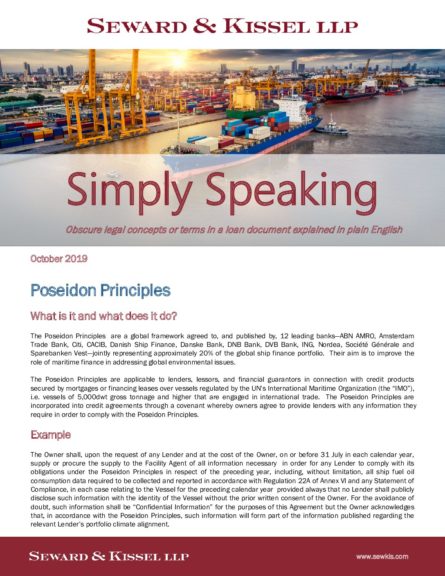
Simply Speaking (October 2019) — Poseidon Principles
Poseidon Principles
What is it and what does it do?
The Poseidon Principles are a global framework agreed to, and published by, 12 leading banks-ABN AMRO, Amsterdam Trade Bank, Citi, CACIB, Danish Ship Finance, Danske Bank, DNB Bank, DVB Bank, ING, Nordea, Société Générale and Sparebanken Vest-jointly representing approximately 20% of the global ship finance portfolio. Their aim is to improve the role of maritime finance in addressing global environmental issues.
The Poseidon Principles are applicable to lenders, lessors, and financial guarantors in connection with credit products secured by mortgages or financing leases over vessels regulated by the UN’s International Maritime Organization (the “IMO”), i.e. vessels of 5,000dwt gross tonnage and higher that are engaged in international trade. The Poseidon Principles are incorporated into credit agreements through a covenant whereby owners agree to provide lenders with any information they require in order to comply with the Poseidon Principles.
Example
The Owner shall, upon the request of any Lender and at the cost of the Owner, on or before 31 July in each calendar year, supply or procure the supply to the Facility Agent of all information necessary in order for any Lender to comply with its obligations under the Poseidon Principles in respect of the preceding year, including, without limitation, all ship fuel oil consumption data required to be collected and reported in accordance with Regulation 22A of Annex VI and any Statement of Compliance, in each case relating to the Vessel for the preceding calendar year provided always that no Lender shall publicly disclose such information with the identity of the Vessel without the prior written consent of the Owner. For the avoidance of doubt, such information shall be “Confidential Information” for the purposes of this Agreement but the Owner acknowledges that, in accordance with the Poseidon Principles, such information will form part of the information published regarding the relevant Lender’s portfolio climate alignment.
As used herein,
“Annex VI” means Annex VI of the Protocol of 1997 (as subsequently amended from time to time) to amend the International Convention for the Prevention of Pollution from Ships 1973 (Marpol), as modified by the Protocol of 1978 relating thereto.
“Poseidon Principles” means the financial industry framework for assessing and disclosing the climate alignment of ship finance portfolios published in June 2019 as the same may be amended or replaced to reflect changes in applicable law or regulation or the introduction of or changes to mandatory requirements of the International Maritime Organization from time to time.
“Statement of Compliance” means a Statement of Compliance related to fuel oil consumption pursuant to regulations 6.6 and 6.7 of Annex VI.”
Why is it there?
The Poseidon Principles provision has made its way into loan agreements as a result of maritime lending institutions taking on a larger role in developing solutions for the global environmental issues identified by the IMO. The IMO has aimed to address these issues through regulations and initiatives such as Annex VI (setting limits on sulphur oxide and nitrogen oxide emissions from ship exhausts and prohibiting deliberate emissions of ozone depleting substances), Regulation 22 (requiring ships to collect and report data on fuel consumption), and the IMO initial carbon and greenhouse gas strategy (aiming to reduce greenhouse emissions generated by shipping activity by at least 50% by 2050 as compared to 2008, and to reduce carbon dioxide emissions by at least 40% by 2030 and 70% by 2050).
Why is it important (or not so important) to Lender?
The Poseidon Principles provision has begun appearing in loan agreements made with some of the leading maritime financial institutions that have become signatories to the Poseidon Principles. For these banks which play an active role in the transition towards reaching the global climate goals set forth by the IMO, the provision is important to ensure they are able to report their portfolio’s climate alignment annually as required by the Poseidon Principles. The provision states that the information provided by the relevant borrower will be kept confidential, but requires the borrower to agree that this information will be used for the lender’s reporting requirements under the Poseidon Principles.
How does it affect Borrower in practical terms?
In practical terms, the provision regarding Poseidon Principles is not particularly burdensome for borrowers, who are generally required through other provisions in their loan agreements to report information regarding vessel operations, IMO compliance and emissions as lenders may reasonably require.
How is it relevant to shipping?
Signatories to the Poseidon Principles are some of the leading maritime financial institutions that have agreed to annually report the overall climate alignment of their respective shipping portfolios and supporting information each year. “Climate alignment”, according to the Poseidon Principles, is the degree to which a vessel’s (or portfolio’s) carbon intensity is in line with the IMO’s decarbonization trajectory for the respective ship type and size class.
How is it negotiated?
The model Poseidon Principles provision was developed by lending banks with input from owner-borrowers, and as an information undertaking, it may not add any additional burden on borrowers (as lenders often already have a broad information right). Some borrowers may object to specifically identifying the types of information being provided, or prefer to limit the obligation on a best efforts basis if the information being required by the lender is not readily available.
Questions?
Please contact any member of S&K’s Maritime Practice Team.